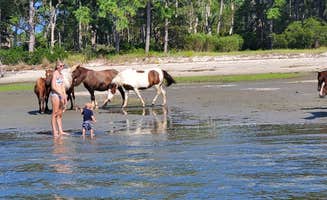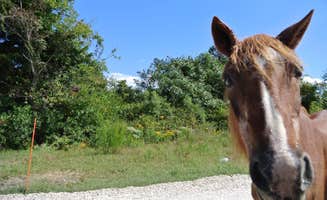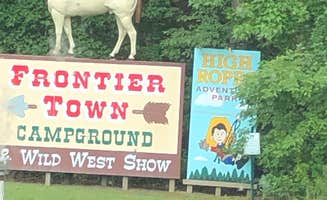Equestrian camping near Chincoteague Island, Virginia offers visitors direct access to diverse coastal ecosystems and riding trails. Located on a barrier island along the Atlantic coast with elevations rarely exceeding 10 feet above sea level, the area experiences strong ocean breezes and salt spray that create unique camping conditions. Winter temperatures typically range from 30-50°F while summer highs reach 85-95°F with high humidity.
What to do
Beach riding along Assateague shoreline: Trail connections from the horse camping area lead to miles of pristine beach riding opportunities. "The natural coastal environment provides excellent riding opportunities with miles of beach and inland trails accessible directly from the campground," according to experienced riders at Assateague Island National Seashore Oceanside Campground. Riders can experience both bay and ocean-side environments.
Wildlife viewing from horseback: The wetland areas provide exceptional wildlife viewing opportunities for equestrians. "I've seen horses everytime I have camped here. We always go during the winter or early spring months to avoid the bugs as they are awful during the spring and summer," notes one camper from Assateague Oceanside. Morning and evening rides offer the best chances to spot the island's famous wild ponies, waterfowl, and deer.
Kayaking adjacent to horse areas: When taking a break from riding, explore the waterways near the camping areas. A visitor at Tom's Cove Park shares: "My husband and son kayaked from the campground over to a lovely sand bar off of Assateague Island. They got within very close range of a herd of ponies grazing at low tide, hung out, and enjoyed their private slice of nature."
What campers like
Self-contained beach camping: For equestrians with proper vehicles, beach camping offers exceptional access. "I grew up here and the beach camping is awesome if you have a self contained vehicle that is 4x4. A permit is required but it's for 12 months," explains a local camper from Oceanside Assateague.
Winter and early spring visits: Many experienced equestrian campers prefer off-season trips. At Bayside Assateague Campground, one visitor reports: "We only stayed on Assateague for 1 night on our way down the east coast. We camped on the bayside which had a really pretty view of the marsh and large camp sites... We took a ride over to the ocean camp sites and found some horses! Worth a stop just for the simplicity of it all!"
Proximity to island trails: Horse campers appreciate the quick access to riding areas directly from the campgrounds. A camper notes, "The tent camping area is in a beautiful grove of well trimmed Loblolly Pines. The trees were great for hanging hammocks, and also provided the perfect amount of partial shade. Our site was very close to the bathroom/shower houses, and across from the pool as well."
What you should know
Bug preparation essential: The coastal environment creates intense insect pressure during warm months. "Love this place but be prepared for the bugs. Even enjoyed this in the winter," cautions one visitor at Bayside Assateague. Mosquitoes, biting flies, and ticks are prevalent from May through September, especially during dawn and dusk hours.
Horse containment requirements: Since the campground doesn't provide corrals, equestrians must bring appropriate containment systems. One experienced camper notes: "Plenty of places to explore. Several trails to walk or bike. Be prepared for the bugs depending on the season. Some years we've had no issues, some years the flies were bad. The mosquitos are kept at bay with bug spray are citronella candles."
Weather considerations: The exposed coastal position makes the campground vulnerable to weather events. At Tall Pines / Chesapeake Bay KOA Holiday, campers experienced challenging conditions: "We were guided to Site 50, which was an easy back-in with the utilities nicely placed... Our site was back by the cabins, which were all in excellent shape." Wind protection for horses and equipment is particularly important during spring and fall storms.
Tips for camping with families
Wild pony interaction rules: Families must maintain appropriate distance from both domestic and wild horses. "The horses are giant trash pandas. They're smart and can open latches so do bring bungee cords, kayak straps, or ratchet straps to lock all of your food in cases or coolers," warns a camper from Assateague Island National Seashore Oceanside Campground. Children should be closely supervised around all horses.
Alternative campgrounds nearby: When equestrian sites are full, nearby options provide different amenities. At Tom's Cove Park, a visitor shares: "They have a wonderful pool and are a short distance from chincoteague beach! Great place to stay with family! Sites are big we fit two large tents on one site. They have a water park down the road and fishing off the pier."
Educational opportunities: Include educational aspects about coastal horses in your family trip. A visitor at EA Vaughn Wildlife Management Area notes: "Lots of trails. Pretty busy with Hunters during the season." The trails connect different ecosystems, allowing families to observe varied wildlife and habitats from horseback.
Tips from RVers
Specialized equestrian RV sites: Horse camping with RVs requires specific preparation. "Sites are level and have a paved area. Easy to back into. Not much as far as privacy and the bathrooms are pretty basic," mentions an RVer at Oceanside Assateague National Seashore. The horse camping section accommodates RVs up to 30 feet, but longer units may have difficulty maneuvering.
Reservation timing: RV sites with horse accommodations book quickly during peak seasons. "The campground maintains strict policies regarding horses brought to the island," notes a frequent visitor. Reservations for equestrian camping should be made 6 months in advance for summer weekends and 3-4 months ahead for spring and fall weekends.
Water management: Limited hookups means careful water planning for horse needs. An RVer advises: "No electric hookup or water which is expected for winter camping, we managed without for the night." Each horse requires 5-10 gallons daily, so RVers should arrive with full freshwater tanks and prepare to haul additional water from central spigots.





